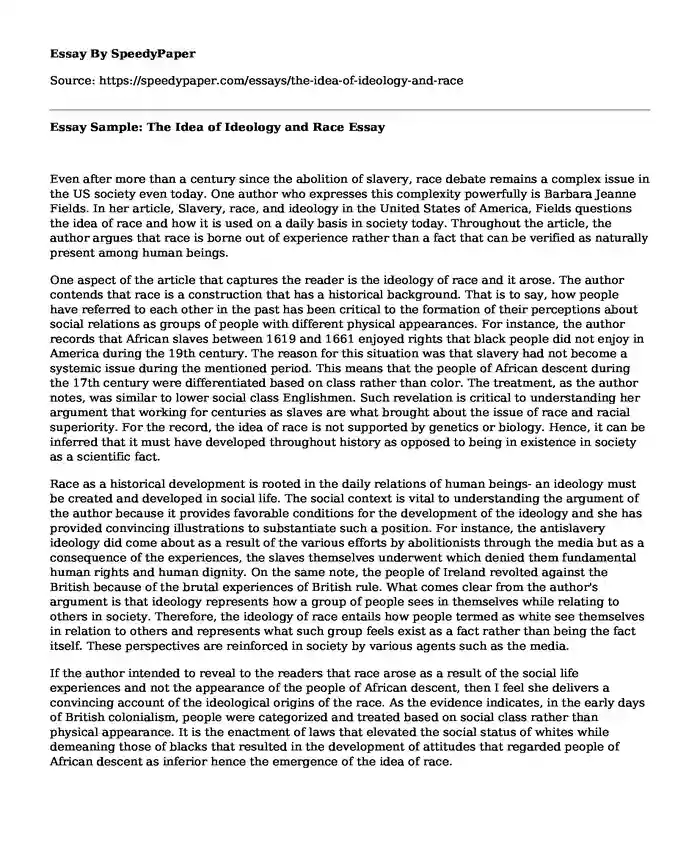Even after more than a century since the abolition of slavery, race debate remains a complex issue in the US society even today. One author who expresses this complexity powerfully is Barbara Jeanne Fields. In her article, Slavery, race, and ideology in the United States of America, Fields questions the idea of race and how it is used on a daily basis in society today. Throughout the article, the author argues that race is borne out of experience rather than a fact that can be verified as naturally present among human beings.
One aspect of the article that captures the reader is the ideology of race and it arose. The author contends that race is a construction that has a historical background. That is to say, how people have referred to each other in the past has been critical to the formation of their perceptions about social relations as groups of people with different physical appearances. For instance, the author records that African slaves between 1619 and 1661 enjoyed rights that black people did not enjoy in America during the 19th century. The reason for this situation was that slavery had not become a systemic issue during the mentioned period. This means that the people of African descent during the 17th century were differentiated based on class rather than color. The treatment, as the author notes, was similar to lower social class Englishmen. Such revelation is critical to understanding her argument that working for centuries as slaves are what brought about the issue of race and racial superiority. For the record, the idea of race is not supported by genetics or biology. Hence, it can be inferred that it must have developed throughout history as opposed to being in existence in society as a scientific fact.
Race as a historical development is rooted in the daily relations of human beings- an ideology must be created and developed in social life. The social context is vital to understanding the argument of the author because it provides favorable conditions for the development of the ideology and she has provided convincing illustrations to substantiate such a position. For instance, the antislavery ideology did come about as a result of the various efforts by abolitionists through the media but as a consequence of the experiences, the slaves themselves underwent which denied them fundamental human rights and human dignity. On the same note, the people of Ireland revolted against the British because of the brutal experiences of British rule. What comes clear from the author's argument is that ideology represents how a group of people sees in themselves while relating to others in society. Therefore, the ideology of race entails how people termed as white see themselves in relation to others and represents what such group feels exist as a fact rather than being the fact itself. These perspectives are reinforced in society by various agents such as the media.
If the author intended to reveal to the readers that race arose as a result of the social life experiences and not the appearance of the people of African descent, then I feel she delivers a convincing account of the ideological origins of the race. As the evidence indicates, in the early days of British colonialism, people were categorized and treated based on social class rather than physical appearance. It is the enactment of laws that elevated the social status of whites while demeaning those of blacks that resulted in the development of attitudes that regarded people of African descent as inferior hence the emergence of the idea of race.
References
Fields, B. J. (1990). Slavery, race and ideology in the United States of America. New Left Review, 1(181), 95-118.
Cite this page
Essay Sample: The Idea of Ideology and Race. (2022, Nov 15). Retrieved from https://speedypaper.net/essays/the-idea-of-ideology-and-race
Request Removal
If you are the original author of this essay and no longer wish to have it published on the SpeedyPaper website, please click below to request its removal:
- Car Crash While Hitchhiking - Free Essay with Literary Analysis
- Personal Development Plan - Leadership Essay Example
- Development of Human Resource Management. Essay Sample.
- Business Essay Sample: Strategy Formulation and Processes
- Essay Example on Planning Social Change: Nigeria
- Essay Sample on How Social Movements Affect Public Relations
- Summary of Telehealth (Care on Demand). Paper Example
Popular categories





